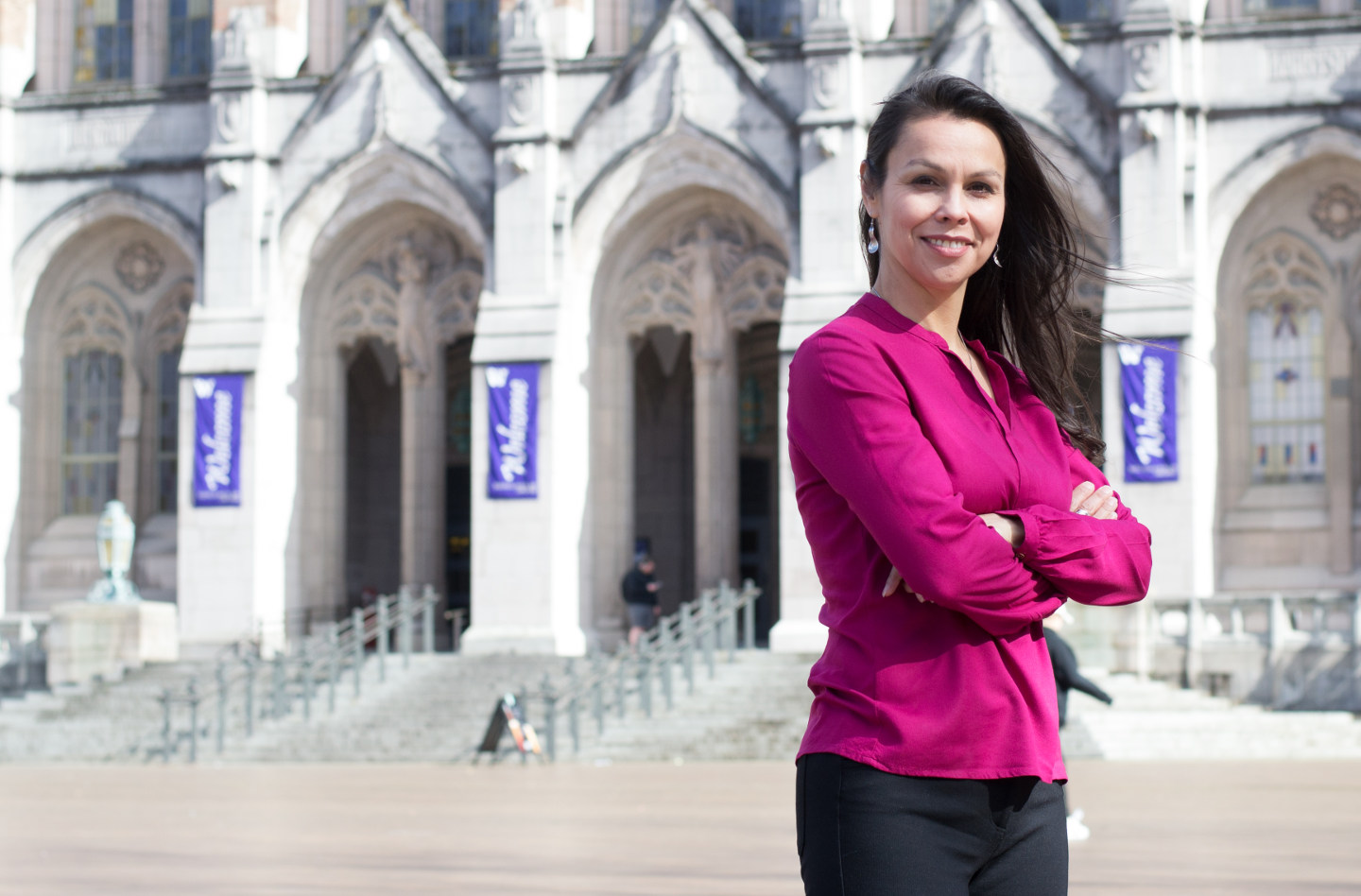Nicole Kuhn found the iSchool during the most challenging time of her life. After the unexpected death of her husband, she was left as the sole parent of their four young children.
She suddenly had to change her life plans. Years before, she’d started an undergraduate degree in Canada and she had always intended to finish her degree when her kids were older. Her husband’s death sped up those plans.
Kuhn, a Haida member of the Skidegate First Nations Band in Canada, had previously worked with First Nations in the Canadian courts. In that job, she had enjoyed administering the statistics program and using the data to help guide choices about resources, management and funding.
“I really loved looking at the big picture and using data to inform important decisions,” she said.
Kuhn began looking for the right school to return to her studies. She soon discovered the UW Information School in her own city, Seattle — a prerequisite because she didn’t want to move her children to a new city after they’d lost their father.
“I was really excited to find the iSchool,” Kuhn said. “It was exactly what I was looking for, the combination of information, computer and social sciences was perfect. Nothing else spoke to me the way the iSchool did. It perfectly captured the work I was doing before that I loved but didn’t have a name for.”
Kuhn began her studies in the Informatics program in the fall of 2016. She started as a part-time student, which made the transition easier for her and her children. Now, she’s attending full time and plans to graduate in 2019.
Kuhn is a recent recipient of the Information School Students First Endowed Scholarship, which supports first-generation college students. The scholarship will help her continue her education while also supporting her family.
Kuhn, who will be the first person in her family and extended family to get an undergraduate degree, was overwhelmed by the process of going to college and applying for scholarships.
“Nontraditional students can have a harder time with the process,” Kuhn said. “Yet often, they have significant needs that scholarships can really help with.”
Students such as Kuhn often don’t have a recent job or school history, making it harder to collect scholarship requirements such as academic records or references. Applying for the iSchool scholarship, however, felt personable and accessible.
“It spoke to who I was in the iSchool,” she said. “It was right here and easier to access.”
The scholarship has been a big help, Kuhn said.
“As a single mother with four children, I looked at the potential for working and there was just no way for me to work and go to school and be a good parent. Having a scholarship to lessen the financial pressure is a huge help.”
Kuhn, who is from a relatively small tribe in Canada, has discovered that some people have the misperception that all Native Americans receive funding for college.
“There is a belief that because you are Native your school is covered. But that is not true,” she said. “As a Native student, you can come to school with a lot of disadvantage that isn't offset by this extra help that others may presume you get. I'm paying for college without any help from my tribe. I'm really far from home and I'm applying for financial aid like everybody else. I'm doing the same thing but trying to do it in a nontraditional way, which is often the case when you come from a minority population. You have a different way up this mountain.”
Kuhn, given her own Native heritage, was especially drawn to the iSchool’s Native North American Indigenous Knowledge initiative. She has previously worked with tribes and appreciates that the iSchool saw the value of respecting the knowledge of indigenous people. Kuhn soon met Assistant Professor Clarita Lefthand-Begay, who invited her to take her master’s level course, Indigenous Systems of Knowledge.
After completing the course, Kuhn was invited to begin a research project with Lefthand-Begay on tribal institutional review boards. Institutional Review Boards (IRBs) set ethical standards for research that involves human subjects. There isn’t a lot of academic research on tribal IRBs, so Kuhn started with locating all the federally registered tribal IRBs in the United States. Kuhn, Lefthand-Begay and Assistant Professor Myra Parker of the Department of Psychiatry & Behavioral Sciences are now working on closely comparing six tribal IRBs for their similarities and differences, and also how they differ from non-tribal IRBs.
Kuhn explains that regular IRB agreements don’t often take into consideration the unique needs of tribes, which in addition to each having their own cultural differences, are sovereign nations. It adds a level of complexity to the research review process that hasn’t always been respected or fully understood.
“Tribes have experienced years of culturally insensitive research methodologies,” Kuhn said. “Researchers and tribal communities need to assess the risk and benefits to the tribal community in addition to the individual research participants.”
It’s vital for tribes to be able to choose research that meets their communities’ needs, to have an active role in the research conducted in their communities, and to have ownership of the research data. If a tribe works with a researcher, but then the researcher never shares the results with the tribe in meaningful ways, the tribe has no way to benefit from work it helped produce. Kuhn hopes that, ultimately, her work can help remove barriers for tribes and researchers who want to work respectfully with tribes, with appropriate research review processes.
It is this kind of work that inspires Kuhn and makes her want to continue her studies at the iSchool — next she plans to apply to the Ph.D. program.
“This work is very powerful to me and there are so many important research questions that need to be asked and answered,” Kuhn said.
